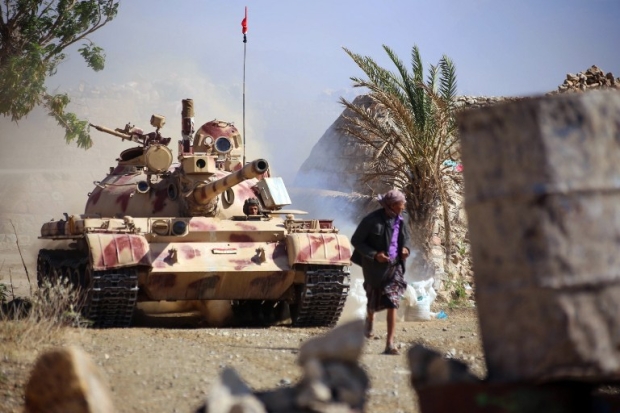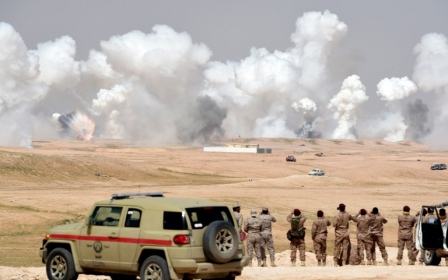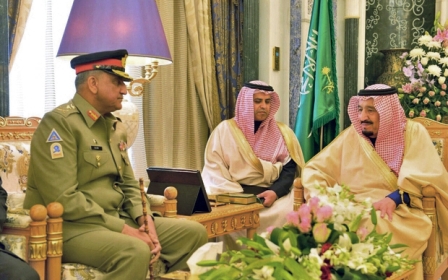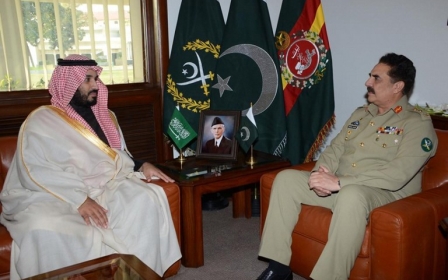Saudis hire world's biggest PR firm to push 'Muslim Nato'
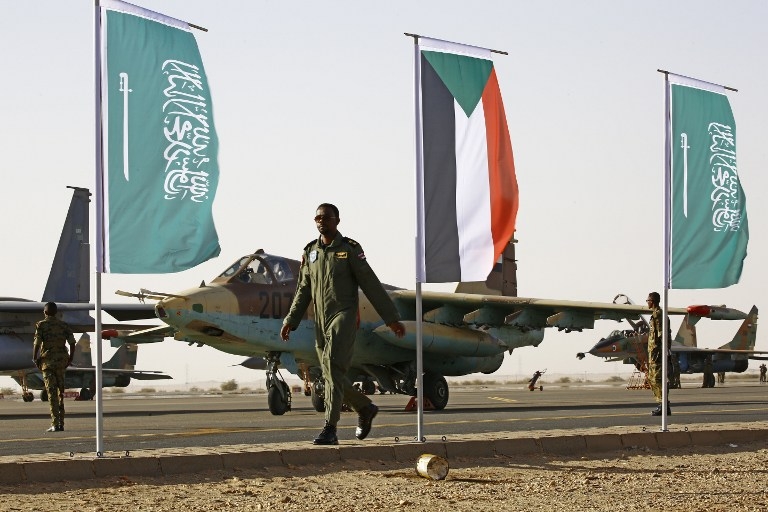
An international public relations firm is facing accusations of complicity in "whitewashing" alleged Saudi Arabian war crimes in Yemen after signing a deal to represent a Riyadh-dominated military alliance dubbed the "Muslim Nato".
Middle East Eye understands that Saudi Deputy Crown Prince Mohammad Bin Salman hired Burson-Marsteller last month to wage a charm offensive on behalf of the Islamic Military Alliance to Fight Terrorism.
However, Saudi Major General Ahmed Asiri, a key figure in establishing the alliance who is currently the subject of a preliminary war crimes investigation by British police, told the Wall Street Journal newspaper last week that the operational scope of the alliance could be extended to include fighting against Houthi rebels battling a Saudi-led coalition in Yemen.
"All countries will put effort into combating terrorism in the member countries, regardless of the nature of the terror groups. That is the main goal,” said Asiri. "Each country has its own expertise that it can contribute to the coalition.”
Burson-Marsteller is owned by the London-based WPP, the world's largest marketing group, and has offices across the Middle East including in Riyadh and Jeddah, according to its website. MEE understands the firm's London office is taking the lead on the new contract
The contract will see Burson-Marsteller promote the Muslim alliance and its future meetings.
Anger from human rights campaigners
But the appointment of the firm has sparked anger among human rights campaigners.
Its previous clients include Argentina's military governments responsible for killing thousands of people in the so-called "Dirty war" of the 1970s and early 1980s.
US television presenter Rachel Maddow remarked in 2009 that, "When evil needs public relations, evil has Burson-Marsteller on speed dial". Responding to that comment, then-CEO Mark Penn said Maddow had "significantly mischaracterised the nature of the firm's past".
Andrew Smith of the Campaign Against Arms Trade told MEE: "The last thing the Middle East needs is an even more aggressive and expansionist Saudi Arabia. The regime and its allies have some of the worst human rights records in the world, and have spent the last two years waging an appalling and destructive war in Yemen.
'The last thing the Middle East needs is an even more aggressive and expansionist Saudi Arabia'
- Andrew Smith, Campaign Against Arms Trade
"UK arms companies have been complicit in the destruction, and now UK PR companies are trying to whitewash it. No amount of spin can alleviate the humanitarian catastrophe or change the terrible reality facing the Yemeni people. No self-respecting company should be lining up to fuel and profit from war and oppression.”
The alliance has previously used US-based lobbyists to secure the attendance of high-profile dignitaries at its conference in Riyadh in January, which was attended by former US secretary of state John Kerry.
Husain Abdulla, executive director for Americans For Democracy & Human Rights in Bahrain, told MEE: "Saudi Arabia, Bahrain and many other members of this coalition are masterful at diverting attention from their systematic human rights abuses. Their participation in the Islamic Military Alliance is a clear example of how they use the fight against terrorism to distract from abuse and repression.”
Burson-Marsteller, which boasts of its "impressive global reach”, previously worked directly for Saudi Arabia in the aftermath of the 9/11 attacks in New York and Washington in 2001.
Working with Prince Bandar bin Sultan, the then-Saudi Arabian ambassador to the United States, it placed adverts in newspapers across the country disassociating Saudi Arabia from the attackers, 15 of whom were Saudi nationals.
Crucial moment for alliance
The appointment of Burson-Marsteller comes at a crucial moment for the alliance as it prepares to hold its first major meeting of defence ministers.
The new grouping, which is modelled along the same lines as NATO with Saudi Arabia the largest player, is dominated by Sunni-majority nations prompting concern in Iran that it is a sectarian force.
It is headed by a former Pakistani army chief, Gen Raheel Sharif, and members include Bahrain, Turkey, Egypt, Mali, Chad, Somalia and Nigeria, a string of nations who have faced recent scrutiny for their human rights records.
Key figures within the alliance, including the Pakistani defence minister, have denied it is a sectarian force and have sought to downplay tension with Iran, Saudi Arabia's regional rival which has supported Houthi rebels in Yemen against forces loyal to President Abd Rabbuh Mansour Hadi.
But moves to deploy Pakistani troops along Saudi Arabia's southern frontier with Yemen, as exclusively reported by MEE last month, are likely to heighten concern in Tehran about the alliance's ambitions.
Saudi Arabia's use of western PR firms predates the Yemen conflict, and there have been long-running concerns that Riyadh uses London and Washington-based PR firms to distract attention from its use of the death penalty.
Last year it emerged that a US subsidiary of Publicis Groupe, the French media conglomerate that owns UK brands such as Saatchi & Saatchi, distributed an article in which the kingdom's foreign minister Adel bin Ahmed Al-Jubeir implicitly attempted to justify the execution of 47 people.
The Newsweek article prompted allegations that one of the world's largest advertising agencies was helping Saudi Arabia "whitewash” its record on human rights following the kingdom's largest mass execution for more than 30 years.
Al-Jubeir argued that they were part of Saudi Arabia's fight against terrorism. The kingdom had "arrested extremists within its borders, tried them before specialised courts and imposed the ultimate penalties on those convicted”, he wrote.
The article – entitled "The Saudis Are Fighting Terrorism, Don't Believe Otherwise” – was distributed by Qorvis MSLGroup, a subsidiary of Publicis Groupe that has been working with Saudi Arabia for more than a decade, The Independent newspaper reported.
Maya Foa, a director at London-based rights group Reprieve, told MEE: "It's no secret that Saudi Arabia's government has one of the worst human rights records in the world. In the last few years alone we've seen a soaring number of executions in the kingdom – including of juveniles who were sentenced to death for attending protests – while the use of torture to extract ‘confessions' is routine. It's deeply disturbing that PR firms are happy to help cover up these activities. Surely any responsible business would refuse to play a part in the whitewashing of gross abuses.”
The use of Qorvis MSL Group and Burson-Marsteller come after Saudi Arabia's US embassy launched the website Arabia Now in 2015. It was described in a press release as an "online hub for news related to the Kingdom”.
The site carries positive articles and blogs about Saudi culture, its fight against terrorism, and economic development.
Arabia Now has given extensive coverage to the alliance including the announcement in January that Oman was set to become the 41st member of the alliance.
MEE contacted Burson-Marsteller for comment but did not receive a response. The alliance declined to make as spokesperson available for interview.
New MEE newsletter: Jerusalem Dispatch
Sign up to get the latest insights and analysis on Israel-Palestine, alongside Turkey Unpacked and other MEE newsletters
Middle East Eye delivers independent and unrivalled coverage and analysis of the Middle East, North Africa and beyond. To learn more about republishing this content and the associated fees, please fill out this form. More about MEE can be found here.


